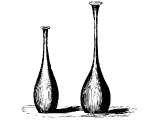 The High Cost Of Butter
The High Cost Of Butter
Introduction
None of us can escape the obvious fact of rising prices. Some of you perhaps can remember when a loaf of bread could be purchased for five cents; gasoline for fifteen cents a gallon; a car for six hundred dollars, or thereabouts; postal cards for one cent. Times have changed, yes; and with the change of time, there is less change from a dollar. Everything today has a high price, and, too, there is the high cost of low living paid by many thousands each day, and they ned not be many thousands of miles away.
There is the unusually high price of butter. Quite unlike the other items already mentioned, some of which have skyrocketed in price over the years, the high cost of butter has been high since time immemorial. But, lest I mislead you, let it be said that 1 (10 not mean the commodity served on the table, but the kind that is spelled BUT–er. The kind we get when some member of the church says, I would like to do that but–er; I would like to teach that class but–er; I just don't think that I can give this time–the same ending. I have a simple question:
Are you willing to pay the high cost; how long shall we continue to do so? I think something should be done about it NOW. For far too long have we said, in one way or another, "I'd rather fight than switch!" Just what does it cost, who buys it, in what relationship does it stand to the purchase of bread? I mean the Bread of Life, and here are some typical examples of purchases which could be made conclusively and positively:
- The chairman of the nomin4ting committee approaches you–remember the last time you gave an excuse?
- Faithful attendance at the services of our church;
- Tithing, not "tipping," but taking God at His Word;
- Reading the Bible.
The list is endless, but how well do you recall the last time you said yes, but–er. When we give excuses, we have to be willing to pay the price.
A Close Fellowship With God

The fellowship of Adam with God. He walked and talked with Him but this was before he bought his temptation. In his case, it was the "High Cost of Butter." In his case he said, "I know I should . . . but–er."
There is recorded in John 1:3: "That which we have seen and heard declare we unto you, that ye also may have fellowship with us: and truly our fellowship is with the Father, and with his Son Jesus Christ." For us today, there is something to live for and the fellowship becomes sweeter. We sing a song, "Every Day with Jesus IS Sweeter than the Day Before." If one is robbed of the sweetness and the fellowship with his Lord, the price paid is high.
A Peace With God (and Man)
The following is the story "That Single Thread." J. Stuart Holden was being shown through a large factory where hundreds of looms were spinning very fine thread. The manager of the mill said to Mr. Holden, "So delicate is this machinery that if a single thread of the entire 30,000 which at this moment are being woven should break, all of these looms would instantly stop." He stepped to one of the machines and broke a single thread. Suddenly every loom was still, and it remained so until the thread was rejoinecr, whereupon the machinery was again in motion.
The mechanical wonder exhibited in the factory that day clearly illustrates that which is spiritual. It is through one act of disobedience, IT IS SAYiNG, IN EFFECT, BUT–ER, that fellowship with God is broken. One departure from the will and fear of God, and the blessings of our fellowship are stopped. NOT UNTIL that thread is rejoined will the joy of the Lord flow again in our hearts. We say, I know that I should bring my burden to the Lord, but–er–we become impatient. We thus lose a great deal of insured peace that we could have with God because of the excuses we make. There is the high cost of butter with regard to the great peace that we forgo. This peace works in two directions:
There is the vertical relationship between the individual and God; there is the horizontal relationship between the individual and his fellow man. When these are properly oriented and experienced, there comes to the individual an unusual peace; he is close to loving this proven relationship, or, as we read in Zechariah 8:19. "Love the truth and peace." To serve God is to serve man; to serve man is to serve God, and there comes to us the statement from Jesus, "As you have done it unto the least of these my brothers, you have done it unto me."What we are saying is, to live in peace with man is to live in peace with God. We know "If at all possible, live peaceably with your neighbor."
But when we make these excuses and buy this but–er, we lose this cherished peace. God bestows peace upon those who obey Him; therefore, we should seek, follow, cultivate, speak and live in peace.
"Great peace have they which love thy law . . . " (Psalms 119:165). Peace accompanies the love of God's law, so that when His law is broken we then have been robbed of a portion of God's peace.
Costs Many Their Testimony

We say, I know I should witness but–er. To buy this butter is, in short, to buy sin–there is no getting around it Sin will bring its judgment in any Christian life! It cost Lot's wife, it cost Samson. Has it cost you your testimony of Christian life? Sin can enter one's life to the extent that it leads others wrong. We are reminded of the story of a woman who had a canary. In the springtime she felt sorry for its being cooped up in the house; she thought that if she placed the cage outside, it would benefit from the new environment and the atmosphere of feathered friends.
She therefore placed the cage under a large oak tree, unawares that this tree was the favorite roosting place of a flock of English sparrows, with the result that in a very short time her sweet-singing canary lost all of its sweet notes. It had spent part of the summer in bad company and this had cost it its sweet song. In life, there are many professed Christians who had a beautiful testimony several years ago, or months ago, but they have lost their witness. They would "Speak with the tongue of man and of angels;" now "they have become as sounding brass or tinkling cymbal." They have broken step with God and lost the experience.
We buy this butter and pay its high price so long that we forget what it means to be sensitive to God's voice.
The Best Purchase
Our text is found in Proverbs 23:23, which reads: "Buy the truth and sell it not."
We can follow this parallel regarding "with butter there is bread." Jesus is the Bread of life, as He declared Himself to be. Jesus is the truth; "Buy the truth and sell it not.""I am the truth" echoes from the rocks and hills of Palestine; from the clouds and stars echoes: "Grace and truth came by Jesus."
The best purchase usually entails a high price, and this high price is seen in the submission of our wills; the sacrifice of our desires; braving persecution and in the price of consideration. These are the prices paid for the truth that we need. As a Christian, serve God in truth as did Joshua; meditate upon it; "bind it about our neck and write it upon the tables of the heart."
In regard to this best purchase, there is the selling of it. Pilate sold it and he said, but–er. "Pilate therefore said unto Jesus, Art thou a king then? Jesus answered, Thou sayest that I am a king; to this end was I born and for this cause came I into the world, that I should bear witnes& unto the TRUTH. Everyone that is of the truth heareth my voice. Pilate saith unto him, What is truth?" (John 18:37). Here we see that Pilate actually sold the truth, literally and figuratively.
In Conclusion
The butter of excuses is purchased when the living bread is sold.
- It is sold when worldly interests supersede the spiritual;
- It is sold when our practice does not consistently bear out our profession;
- It is sold when we do not live our Christianity;
- It is sold when we shirk our obligations;
- It is sold when we do not worship–not worshipping in truth is, in effect, selling it and selling its privileges.
Buy the truth, live the truth, teach the truth and sell it not. There is a high price for those who say, "I know I should trust God for my salvation, but–er." It is a high price tci pay as a Christian. This involves new plans, new ideas, new frontiers. There is a high price to pay in remaining chained instead of changing, and thus saying BUT–ER, I can't. Are you willing to pay the high price of butter?

Look up another Note